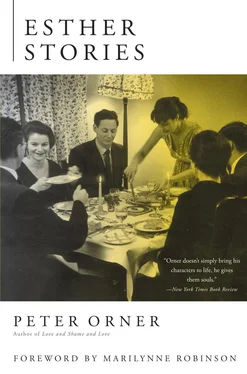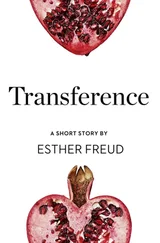The reception is in the basement of Walt’s Elk Lodge. The two of them stand in front of the empty trophy case, watching. Walt elbows her. “Want another hot dog on a stick?”
“Yes.”
“Another glass of champagne?”
“Yes.”
“Kiss on the kissa?”
And Walt, hot dog — mouthed, kisses her and the people dance and her daughter floats by whispering elegant nonsense, and even the Elk’s cheap chandelier is high-class. They’ve killed Kennedy and we might be in a new war. Nobody seems to know for sure except Walt, who says, “Absolutely we are, don’t let anybody fool you, it’s war.” Either way, all that counts is that Arthur’s got two bum knees and glasses thick as dictionaries. Walt says they can’t make him go anywhere. Rhoda’s got the best figure of any girl here, even better than Dotty Packer’s niece, the one marrying that hoodlum from Swansea. Walt chomps another hot dog on a stick, holds up the stick, and looks at it. “I could have invented this. I’d have bought you an island with the money.”
Rhoda prances over like an excited colt. She’s dragging Arthur by the hand. Her face is plump and cherry and maroon and pink from lipstick kisses. “Mother, I want you to dance with Arthur. I’ll whirl Daddy.”
Sarah closes her eyes and lets this giant sway her. His big hands grip her waist, and Lord, she feels things she shouldn’t. She whispers, “Hurt a hair on her head and I’ll pry out your eyes with a shrimp fork.” Arthur cackles and squeezes her tighter, and she loves it, the squeezing. The husband of my daughter only an hour. She’ll take this to the grave, but right now, Sarah lets it ooze through her like the champagne. She’s exhausted and lusty, and what else is there in this world? Someone digs a long nail into her shoulder and whispers, “Congratulations, Mrs. Mother-in-Law,” and without opening her eyes she sees everything. Those snoots, the in-laws, hiding at their table, wishing they were back in Rhode Island; Walt hamming, doing his strange version of the rumba, while the rest of the room slow-dances to “Love Me Tender.” So many cars in the Elk’s parking lot people had to park over at the Al Mac’s. The bandleader’s shoulders, tight in a tuxedo three sizes too small for him. The wiggle of the chandelier tears. The way they swing light. She created this. She never wanted an island. She wanted this.
Arthur’s steamy chocolate breath on her neck, his limp and his bad eyes that protect him from people who want to send him away to get killed. And he will take Rhoda up in these arms tonight, but he won’t smother her, even though he’s so huge his Abraham Lincoln feet don’t fit on the bed. She can hear his big shoes thump and the tink tink of Rhoda’s white heels landing. And she can hear Rhoda sigh. Like her father, she’s always been melancholy. All of this will finally make her sad, and Arthur will know this but not understand. And Rhoda won’t explain it to him because she doesn’t know enough to explain. He will accidentally knock the clock over with a klutzy elbow, and Rhoda will grab him as he leans over and order, Leave it, the clock, leave it. And they will leave the clock on the floor and the light on, too, and they will love and push and grip and pull and wander and twist and love it and love it, and maybe hurt, too, in each other’s bodies until finally exhaustion creeps and overtakes. But their sleep will not be peaceful, because in it they will leave each other. And before dawn they will wake up tired in the flood of lamplight, and for too many moments they will be wretched and wonder why silently, without telling the other, because they won’t understand, because they’re too young to understand, because it takes years to understand — she thinks of Walt, who will hide in the Men’s and wheeze after this dance — why the morning will always be harder than the nights.
WALT. Mesmerized by Uncle Alf Dolinsky’s feet. Dolinsky is lying on his bed in his newly polished brogans, enjoying himself. What’s there not to enjoy? It’s summer and they’re at the Conrad Hilton. Walt and Alf Dolinsky in Chicago for the National Furniture Retailer Association’s annual convention. Yet there’s a glitch. Walt’s standing again for vice president. Nobody ever runs against anybody, the votes are a formality, only this year he’s facing a challenge from an upstart barely out of his twenties, sells period furniture in Cincinnati. Alf says the kid’s a maggot, sells antiques, for Christ sake, and hasn’t got a Good Humor’s chance in hell of getting elected. But Walt knows better. He’s been around long enough to know that the only thing left to become after making it anywhere in this world is a has-been, and he’s already served on the association’s board ten years — was even president from ’57 to ’59—and now there’s this pimple-face telling every buttonhole in the hotel lobby about the need for new blood. And the old blood? It’s another death knell, the bell that’s been donging in Walt Kaplan’s ears for more years than he wants to remember. Walt Kaplan? What ever happened to him? Guy could sell you the hole in a doughnut.
“Period furniture,” Walt says finally. “New stuff, just looks old. If he sold antiques, he wouldn’t be a retailer.”
“Only you could find a way to worry in Chicago,” Alf says.
Walt doesn’t move, only stands there bending back his thin, pale fingers — his father once said he had a woman’s hands because they were so small and always cold. He’s still entranced by Alf’s clodhoppers. Dolinsky’s greatest joy, lying on a bed in his shoes. Maybe this is why he comes on these trips in the first place, because if he pulled this at home, his wife, Doris, would bust his jaw. Uncle Alf, a real uncle once, to his nephew Gary, Charlie’s son, the one who died exercising. Walt always knew that stuff would kill you.
“It isn’t that.”
“Not what?”
“The kid from Ohio.”
Now it’s Alf who turns silent, who stares at the ceiling, then the window. The city’s below them, crawling lights and honks. Even up here they can hear the doorman whistling for cabs. The window’s open, and a breath of damp wind grazes Alf’s cheek. He watches it toss the drapes, billow them, and he thinks of a dress that once did that, furled as it turned away from him. A dress he once called Eva Pearlmutter.
“We’ve been friends how long?” Alf says.
Walt murmurs, “Long time.”
“Gimme a figure.”
“I don’t know. Since McKinley.”
“Thirty-four years and a month and a half. It was June your brother beat up my brother.”
“All right, thirty years.”
“So knock it off.”
Walt paces. The room’s got red carpet and white walls. They say every room at the Conrad Hilton’s different, but his room is always the same: red carpet, white walls, brass bed. Not decorated like the kind of place for two wash-ups to be alone together, but being with Alf is almost the same as being by yourself, only slightly smarter. Besides, there’s lots of times he’d rather be alone with Alf Dolinsky than Sarah, hotel room or no hotel room. Doris calls Alf the Flabby. She says, Where’s the Flabby today? Oh, the Flabby wants another piece of salami, doesn’t the Flabby? He works for Dave Rubin’s cookie company, but his toughest job is being Walt Kaplan’s best friend. They’ve already bought graves, side by side, in the newer old Jewish cemetery across from the Arco Station up President Avenue.
Alf cradles the back of his head and watches Walt clomp across the room, from the window to the door and back again. Alf talks to the ceiling: “Long time since we had one of these. A what’s-it-all-for night! All right, Walt. You want the inventory or the philosophy first? I think we started with philosophy last time, so why not the inventory tonight?”
Читать дальше












